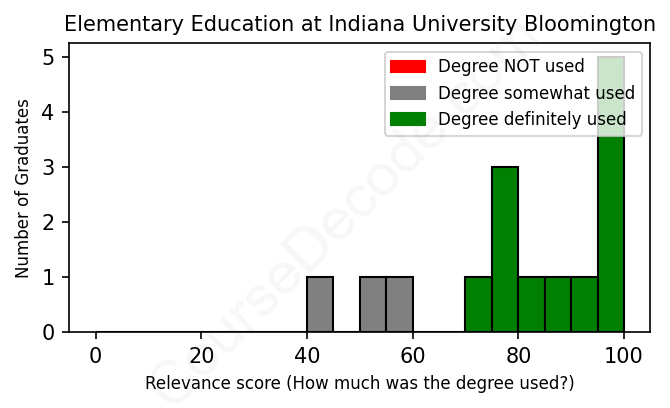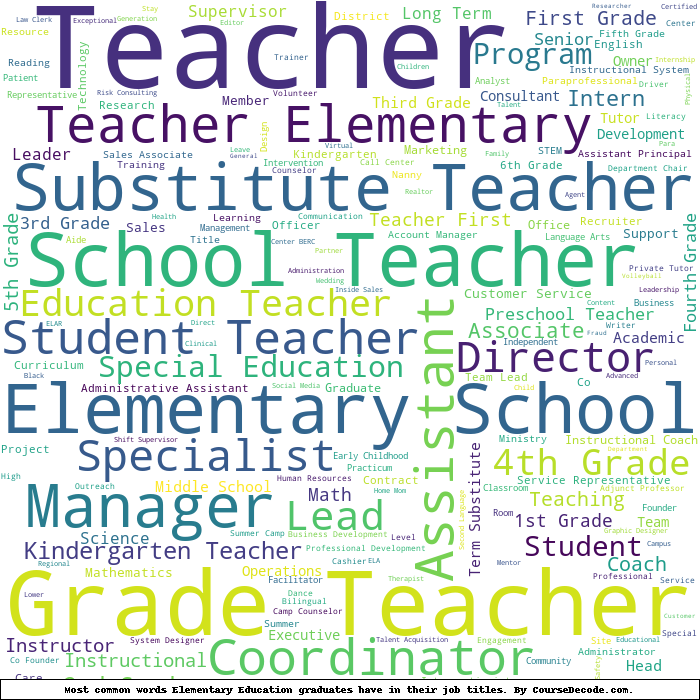
First, some facts. Of the Elementary Education graduates from Indiana University Bloomington we've analyzed , here's how many have used (or NOT used) their degree in their career:

These are estimates based on AI analysis of 15 LinkedIn profiles (see below).
The verdict? Significantly above average. Overall, with an average relevance score of 80%, Elementary Education graduates from Indiana University Bloomington have a much higher likelihood (+13%) of finding work in this field compared to the average graduate across all fields:
And for comparison, here's the chart for all profiles we've looked at across all degrees.
Also, after graduating, 60% of these graduates have pursued further education other than another Bachelor's degree (such as a Masters degree or other), compared to the average across all profiles of 35%. This suggests you may need more than just a Bachelors degree to be competitive as a Elementary Education graduate.
See the details:
|
Relevance score: 77% We think this person has gone into a career highly relevant to their degree. We think this person has gone into a career highly relevant to their degree.
DEGREE INFOGraduated in 2017 from Indiana University Bloomington with a Bachelor's degree in Elementary Education. No other secondary education since. JOB HISTORY SINCE GRADUATIONESL Teacher Rachinee Burana School Sep 2017 - Mar 2018 Pre Kindergarten Teacher  Bright Horizons Oct 2018 - Jul 2019 Kindergarten Teacher  Bright Horizons Jul 2019 - Sep 2019 Elementary School Teacher  Bastrop ISD Jul 2020 - Jun 2022 Placement and Sales Manager  Cultural Care Au Pair May 2022 - Sep 2023 Account Executive  Empowerly Sep 2023 - Present Growth Optimization Team  Empowerly Jan 2024 - Present ABOUTNo information provided. |
The top 10 most common jobs done by the graduates we've analyzed (ranked most common to least) are:
When looking at the career paths of people who’ve graduated with a degree in Elementary Education from Indiana University Bloomington, a clear trend emerges: many have taken on teaching roles, specifically in elementary and primary education settings. Positions like 1st, 2nd, 3rd, and even 4th-grade teachers dominate the list, confirming that the degree is being utilized in its intended field. These teaching jobs are directly relevant to their studies, as they require the knowledge of classroom management, educational theories, and teaching methods that students learn during their time in the program. Even roles like instructional coaches and principals show that graduates are not just stopping at teaching but moving into leadership positions within educational institutions, further illustrating the value of their education.
However, not all paths taken have remained closely tied to the core principles of Elementary Education. Some graduates have ventured into roles that, while they may utilize soft skills like communication and leadership, don't directly connect to the teaching or educational methodologies emphasized in their degree. Positions in administration at community colleges or roles like customer success specialists and social media consultants stray away from a direct educational focus. So, while a good number of graduates are successfully applying their Elementary Education skills in relevant teaching positions, it's also notable that some have explored other opportunities that diverge from what you might expect from their degree. It's kind of a mixed bag—lots of teaching, but a fair share of jobs that drift into unrelated territory too.
Here is a visual representation of the most common words in job titles for Elementary Education graduates (this is across all Elementary Education graduates we've analyzed, not just those who went to Indiana University Bloomington):

So, if you're checking out what grads from Indiana University's Elementary Education program are up to, the overall picture looks pretty solid, especially for those just starting out. Many of them kick off their careers as elementary school teachers or in some kind of educational role right after graduation. For example, several have landed teaching positions at various schools shortly after they graduated—like teaching 1st, 2nd, or even 4th grades. It seems like a common first step for these graduates is diving straight into the classroom, which totally makes sense given their degree.
Fast forward five to ten years, and things start to shift a bit, with some graduates moving into more advanced positions within education. A good number have taken on roles like assistant principal, instructional coach, or even started their own childcare businesses, which shows they’re leveraging their teaching experience to climb the ladder. However, there are also a few who veered off the traditional Route, exploring roles that stray from direct teaching, like instructional design or customer success. Overall, while some have expanded their career horizons a bit, many are still connected to the education sector, indicating that a degree in Elementary Education can lead to varied but ultimately fulfilling paths within and related to education. It's a pretty solid choice if you're passionate about working with kids!
Getting a Bachelor’s degree in Elementary Education at Indiana University Bloomington is pretty manageable if you're dedicated and enjoy working with kids. The coursework is designed to give you a solid foundation in teaching methods, child development, and educational psychology, so you'll be learning a lot, but it’s not overly intense compared to some other majors. You'll have a mix of classroom learning and practical experience through student teaching, which can be super rewarding and definitely less stressful than exams in other fields. Overall, it’s generally considered on the easier side of the spectrum for a degree, as long as you stay organized and passionate about what you’re doing!
Most commonly, in the LinkedIn profiles we've looked at, it takes people 4 years to finish a Bachelor degree in Elementary Education.
Okay, so if we look at these graduates from Indiana University Bloomington, a lot of them have stuck with teaching jobs, which aren’t typically known for huge salaries, especially at the elementary level. Most have had fairly steady careers, bouncing between teaching roles and a few even transitioning into administrative positions, which usually pay a bit better. There's also a couple who started their own businesses, which can lead to higher earnings, depending on success. Overall, it doesn't seem like a lot of them are rolling in cash, but they probably have a decent living, especially if they’ve moved into administrative or specialized roles over time. Just keep in mind that teaching can be super rewarding in ways that aren’t all about the money!
Here is a visual representation of the most common words seen in the "about" section of LinkedIn profiles who have a Bachelor degree in Elementary Education (this is across all Elementary Education graduates we've analyzed, not just those who went to Indiana University Bloomington). This may or may not be useful:

Here are all colleges offering a Bachelor degree in Elementary Education (ordered by the average relevance score of their Elementary Education graduates, best to worst) where we have analyzed at least 10 of their graduates: